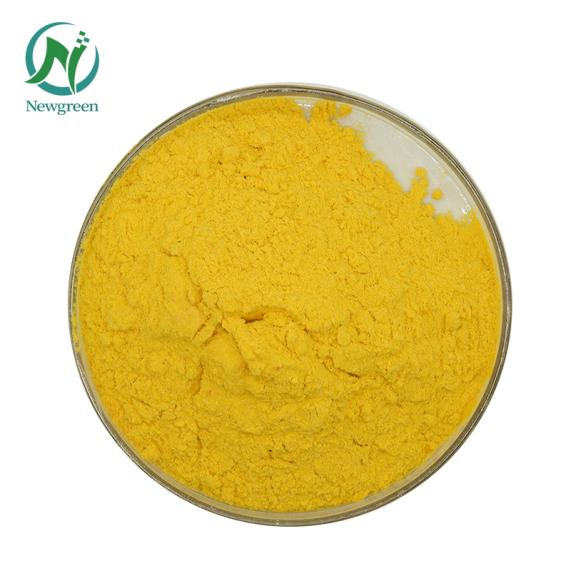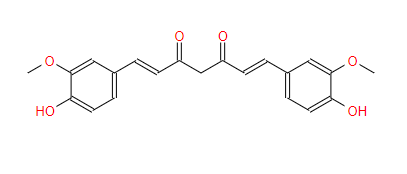
What Is Curcumin ?
Curcumin is a natural phenolic antioxidant extracted from the rhizomes of ginger plants such as turmeric, zedoary, mustard, curry, and turmeric. The main chain is unsaturated aliphatic and aromatic groups. Tuan, a diketone compound, is a commonly used seasoning and food coloring.
Curcumin is a natural compound with good anti-inflammatory and anti-cancer properties. Among them, turmeric contains about 3% to 6% curcumin, which is a rare pigment with a diketone structure in the plant kingdom. Curcumin is an orange-yellow crystalline powder with a slightly bitter taste and is insoluble in water. It is mainly used in food production to color sausage products, canned food, sauce-braised products and other products.
Curcumin has hypolipidemic, anti-tumor, anti-inflammatory, choleretic, and antioxidant effects. In addition, some scientists have found that curcumin can help treat drug-resistant tuberculosis.
Physical and Chemical Properties of Curcumin
Curcumin is a polyphenolic compound with a bright yellow color. Its physical and chemical properties include:
1. Color and Solubility: Curcumin is a bright yellow fine powder that is insoluble in water. It is soluble in organic solvents such as ethanol, dimethyl sulfoxide (DMSO), and acetone.
2. Melting Point: The melting point of curcumin is approximately 183 degrees Celsius.
3. Chemical Structure: Curcumin is a natural phenol and exists in keto and enol forms, with the enol form being more stable in neutral or basic conditions. Its chemical structure consists of two methoxyphenol groups and a β-diketone.
4.Stability: Curcumin is sensitive to pH, light, and heat. It is relatively stable in acidic conditions but can degrade in alkaline environments. Additionally, exposure to light and high temperatures can lead to degradation.
5. Aromatic Properties: Curcumin exhibits aromatic characteristics due to its phenolic rings, which contribute to its antioxidant properties.


What Is The Benefit Of Curcumin ?
Curcumin has been the subject of extensive research and has been linked to a variety of potential health benefits, including:
1. Anti-Inflammatory Properties: Curcumin is known for its anti-inflammatory effects, which can help control inflammation such as arthritis and other inflammatory diseases.
2. Antioxidant Activity: It has strong antioxidant properties that can help protect the body from oxidative stress and damage caused by free radicals.
3. Potential for Joint Health: Some studies show that curcumin can support joint health and reduce symptoms of conditions such as osteoarthritis.
4. Digestive Health Support: Curcumin can help promote digestive health and support the body’s natural inflammatory response in the digestive system.
5. Cognitive Support: Research suggests curcumin have potential benefits for cognitive function and brain health, with some studies exploring its role in supporting memory and overall cognitive health.
6. Potential Anti-Cancer Properties: Some studies suggest that curcumin have anti-cancer properties and play a role in cancer prevention and treatment.
7.Liver Protection: Curcumin have powerful antioxidant and anti-inflammatory properties that can help protect the liver from damage from oxidative stress and inflammation.

What Is The Applications Of Curcumin ?
Curcumin has a wide range of applications across various industries due to its potential health benefits and versatile properties. Some common applications of curcumin include:
1. Dietary Supplements: Curcumin is widely used in the production of dietary supplements, often in the form of capsules or tablets, due to its potential health-promoting properties.
2. Traditional Medicine: In traditional medicine systems such as Ayurveda and traditional Chinese medicine, curcumin has been used for its medicinal properties, and it continues to be an important component in herbal remedies.
3. Food and Beverage Industry: Curcumin is used as a natural food coloring agent, providing a vibrant yellow color to a variety of food products, including sauces, dairy products, beverages, and baked goods.
4. Cosmetics and Skincare: Due to its antioxidant and anti-inflammatory properties, curcumin is utilized in cosmetic and skincare products, including creams, lotions, and serums, where it is believed to offer benefits for skin health and appearance.
5. Pharmaceuticals: Curcumin is being researched for its potential therapeutic applications in pharmaceuticals, particularly in the development of drugs for conditions such as cancer, inflammation, and neurodegenerative diseases.
6. Research and Development: Curcumin is also used in scientific research and development, particularly in studies exploring its biological activities, potential health benefits, and applications in various fields.

What Is The Side Effect Of Curcumin ?
Curcumin is generally considered safe for most people when consumed in amounts commonly found in food or when taken orally in appropriate doses. However, in some cases, high doses or prolonged use of curcumin supplements can lead to potential side effects, including:
1. Gastrointestinal Issues: Some individuals can experience digestive discomfort, such as nausea, diarrhea, or stomach upset, especially when consuming high doses of curcumin.
2. Increased Bleeding Risk: Curcumin can have anticoagulant properties, which could potentially increase the risk of bleeding, particularly when taken in combination with blood-thinning medications or before surgical procedures.
3. Interaction with Medications: Curcumin supplements can interact with certain medications, such as blood thinners, diabetes medications, and drugs that reduce stomach acid, so it's important to consult a healthcare professional before using curcumin supplements, especially if taking other medications.
4. Allergic Reactions: While rare, some individuals can be allergic to curcumin, leading to allergic reactions such as skin rashes, itching, or respiratory symptoms.
5.Pregnancy and Breastfeeding: The safety of curcumin supplements during pregnancy and breastfeeding has not been extensively studied, so it's advisable for pregnant or breastfeeding women to consult with a healthcare provider before using curcumin supplements.

Related Questions You can Be Interested In :
Is turmeric the same as curcumin?
Turmeric and curcumin are not the same, although they are related. Turmeric is a spice derived from the rhizomes of the Curcuma longa plant and is commonly used in cooking, particularly in Indian and Southeast Asian cuisines. It is known for its bright yellow color and warm, bitter taste.
Curcumin, on the other hand, is a bioactive compound found within turmeric. It is one of the active ingredients responsible for the vibrant color of turmeric and is recognized for its potential health benefits, including anti-inflammatory and antioxidant properties.
Who cannot take turmeric?
Certain individuals should exercise caution or avoid consuming turmeric or curcumin supplements. These include:
1. Pregnant or Breastfeeding Women: While turmeric used in cooking is generally considered safe, high-dose curcumin supplements can not be suitable for pregnant or breastfeeding women due to the lack of extensive safety data in these populations.
2. Individuals with Gallbladder Issues: Turmeric can exacerbate gallbladder problems, so individuals with gallstones or other gallbladder conditions should consult a healthcare professional before using turmeric or curcumin supplements.
3. Those with Bleeding Disorders: Due to its potential anticoagulant effects, individuals with bleeding disorders or those taking blood-thinning medications should use turmeric or curcumin supplements cautiously and under medical supervision.
4. Undergoing Surgery: Turmeric and curcumin supplements should be used with caution before surgery, as they can increase the risk of bleeding. It's important to inform the healthcare team about any supplement use prior to surgery.
As with any dietary supplement or natural product, it's advisable to consult with a healthcare provider before using turmeric or curcumin supplements, especially for those with underlying health conditions or those taking medications.
Is it OK to take curcumin daily?
For most people, taking curcumin daily in recommended doses is generally considered safe and may offer potential health benefits. However, it's important to consider individual health status, existing medical conditions, and any medications being taken before starting a daily curcumin regimen. Consulting with a healthcare professional is advisable to determine the appropriate dosage and to ensure that daily curcumin supplementation is safe and suitable for individual needs.
What organ does turmeric affect?
Turmeric, and specifically its active compound curcumin, is known to have potential effects on various organs and systems in the body. Some of the organs and areas that turmeric affect include:
1. Liver: Turmeric is believed to have hepatoprotective properties, potentially supporting liver health and function.
2. Digestive System: Turmeric is thought to have a positive impact on digestive health, including potential support for gastrointestinal comfort and overall digestive function
3. Cardiovascular System: Some research suggests that curcumin may have cardiovascular benefits, potentially supporting heart health and healthy circulation.
4. Brain and Nervous System: Curcumin has been studied for its potential neuroprotective properties and its role in supporting cognitive function and brain health.
5. Joints and Muscles: Turmeric and curcumin are believed to have anti-inflammatory properties that may support joint health and comfort.
What medication should be avoided with turmeric?
Turmeric and curcumin supplements may interact with certain medications. It's important to be aware of potential interactions and to consult with a healthcare professional before using turmeric or curcumin supplements, especially if taking the following types of medications:
1. Blood Thinners (Anticoagulants/Antiplatelet Drugs): Turmeric and curcumin may have mild anticoagulant effects, so they should be used cautiously with medications such as warfarin, aspirin, clopidogrel, and others that affect blood clotting.
2. Medications that Reduce Stomach Acid: Turmeric may increase stomach acid production, so it's advisable to use it cautiously with medications like proton pump inhibitors (PPIs) or H2 blockers, which are used to reduce stomach acid.
3. Diabetes Medications: Turmeric and curcumin may lower blood sugar levels, so individuals taking medications for diabetes should monitor their blood sugar levels closely and consult with a healthcare provider before using turmeric or curcumin supplements.
Post time: Sep-12-2024





